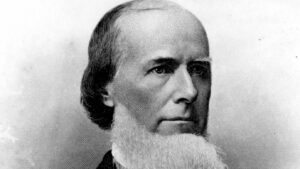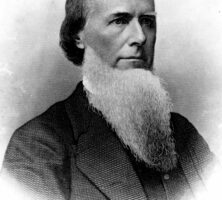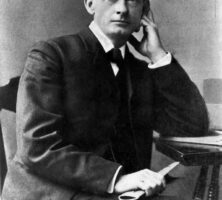The New Georgia Encyclopedia is supported by funding from A More Perfect Union, a special initiative of the National Endowment for the Humanities.
The Civil War governor of Georgia, Joseph E. Brown was one of the most successful politicians in the state's history. A member of the Bourbon Triumvirate, Brown served as a U.S. senator from 1880 to 1890.
The New Georgia Encyclopedia does not hold the copyright for this media resource and can neither grant nor deny permission to republish or reproduce the image online or in print. Requests for permission to publish or reproduce the resource should be submitted to the Hargrett Manuscript and Rare Book Library at the University of Georgia.
Alfred H. Colquitt, a member of the Bourbon Triumvirate, was elected governor of Georgia in 1876. Although his tenure was marked by controversial finances and other scandals, Colquitt is credited with advocating industrialization in the state as a means of recovering from the economic hardships of the Civil War.
From The History of the State of Georgia, by I. W. Avery
The New Georgia Encyclopedia does not hold the copyright for this media resource and can neither grant nor deny permission to republish or reproduce the image online or in print. All requests for permission to publish or reproduce the resource must be submitted to the rights holder.
John B. Gordon, a renowned Confederate officer and political leader, was a member of the Farmers' Alliance in Georgia until the organization's split with the Democratic Party in 1892. A member of the Bourbon Triumvirate, Gordon served multiple terms in the U.S. Senate and, from 1886 to 1890, as governor of the state.
Courtesy of Library of Congress, Prints and Photographs Division, Brady-Handy Photograph Collection.
The New Georgia Encyclopedia does not hold the copyright for this media resource and can neither grant nor deny permission to republish or reproduce the image online or in print. All requests for permission to publish or reproduce the resource must be submitted to the rights holder.
William J. Northen was elected governor of Georgia in 1890 through the efforts of the Farmers' Alliance, an organization dedicated to overcoming the financial problems of southern farmers. Northen was leader of the alliance in Hancock County prior to his election as governor.
The New Georgia Encyclopedia does not hold the copyright for this media resource and can neither grant nor deny permission to republish or reproduce the image online or in print. Requests for permission to publish or reproduce the resource should be submitted to the Hargrett Manuscript and Rare Book Library at the University of Georgia.
Leonidas F. Livingston, pictured in Washington, D.C., in 1897, served in the U.S. Congress from 1890 until 1910. A Democrat, Livingston served as president of the Georgia Farmers' Alliance from 1888 until 1892, but left the organization when it launched the new Populist Party.
Courtesy of Georgia Archives, Vanishing Georgia, #
new283-83.
The New Georgia Encyclopedia does not hold the copyright for this media resource and can neither grant nor deny permission to republish or reproduce the image online or in print. Requests for permission to publish or reproduce the resource should be submitted to the Georgia Archives.
Cotton sharecropper family in Macon County, 1937. The Great Depression did not end in Georgia until the United States entered World War II in 1941.
Courtesy of Library of Congress, Prints and Photographs Division, Photograph by Dorothea Lange, Farm Security Administration - Office of War Information Photograph Collection, #LC-USF34-017922-C.
The New Georgia Encyclopedia does not hold the copyright for this media resource and can neither grant nor deny permission to republish or reproduce the image online or in print. All requests for permission to publish or reproduce the resource must be submitted to the rights holder.
The epithet cracker has been applied in a derogatory way to rural, non-elite white southerners. Linguists now believe the original root to be the Gaelic craic, still used in Ireland (anglicized in spelling to crack) for "entertaining conversation."
Image from James Wells Champney
The New Georgia Encyclopedia does not hold the copyright for this media resource and can neither grant nor deny permission to republish or reproduce the image online or in print. All requests for permission to publish or reproduce the resource must be submitted to the rights holder.
In 1892 Georgia politics was shaken by the arrival of the Populist Party. Led by Thomas E. Watson of McDuffie County, this new party mainly appealed to white farmers, many of whom had been impoverished by debt and low cotton prices in the 1880s and 1890s. The Populists also attempted to win the support of Black farmers away from the Republican Party.
Courtesy of Georgia Historical Society.
The New Georgia Encyclopedia does not hold the copyright for this media resource and can neither grant nor deny permission to republish or reproduce the image online or in print. All requests for permission to publish or reproduce the resource must be submitted to Georgia Historical Society.











